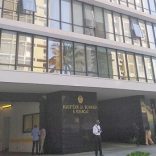Mozambique: Prices rose 0.68% in August after four months of deflation
“Don’t pay the hidden debts,” Mozambican civil society demands – Watch

File photo
A group of Mozambican civil society organisations, known as the G20, has again demanded that the government should not pay the “hidden debts” contracted by security- related companies with European banks in 2013 and 2014, reports Tuesday’s issue of the independent daily “O Pais”.
The term “hidden debts” refer to over 1.1 billion dollars of loans from Credit Suisse and VTB of Russia to the companies Proindicus and MAM (Mozambique Asset Management). A third loan, of 850 million dollars, to Ematum (Mozambique Tuna Company) was not secret, since it took the form of a European bond issue, later converted into Mozambican government bonds. None of the three companies shows any sign of running at a profit in the foreseeable future.
The previous government, under President Armando Guebuza, illegally guaranteed the three loans, thus breaking the budget laws of 2013 and 2014, and violating an article in the Mozambican constitution which states that only the country’s parliament, the Assembly of the Republic, can authorise such debts.
During a session in Maputo on Monday of the Development Observatory, a platform which brings together the government, civil society and international cooperation partners, the G20 insisted that the government must refuse to pay these debts, and hold those responsible for contracting hem liable for any repayment.
The scandal of the Ematum, Proindicus and MAM debts, the G20 spokesperson, Egas Amiel, of the Mozambique Debt Group (GMD), argued, has only one way out: “Hold criminally responsible the Mozambicans who were the authors of these debts, and declare the debts illegal and illegitimate”.
Responsibility for the debts also extended to the creditors, Amiel said, since the banks had acted “in bad faith”. Indeed, there is no sign that either Credit Suisse or VTB had undertaken due diligence of the three companies that requested these enormous loans.
Had they done so they would have found that these were newly created companies (and hence with no business record), and that the main force in their shareholding structure was the Mozambican intelligence service, SISE. Without the government guarantee, neither bank would have extended the loans – but the banks should have known that the guarantees violated Mozambican law and were thus null and void.
The G20 warned of “new challenges” that could worsen Mozambique’s debt situation. Amiel said there are signs that “vulture funds” are entering the scene “with signs of the sale on the secondary market of the debt titles”. This “threatens to increase the weight of Mozambique’s debt obligations”.
Vulture funds are hedge funds or private equity funds that prey upon developing countries by buying up their debt at a discounted price on the secondary market, and then demanding repayment in full from the original debtor, and threatening to pursue them through the courts.
The G20 also protested at the reduction in budgetary allocation to such key sectors as health, education, agriculture and water supply, while state subsidies to “unproductive” public companies, such as Mozambique Airlines (LAM) and the telecommunications company TDM, have increased.
Amiel said that the allocation for health in the 2017 budget was a 23.4 per cent decline, in real terms, on the figure in 2016. For agriculture, he put the decline in expenditure at 2.75 per cent in real terms.
The Minister of Economy and Finance, Adriano Maleiane, told the meeting that 2016 had been an “atypical year”, in which the debt crisis, the suspension of direct support to the budget by donors, and natural disasters had constrained the government’s actions.
But he claimed that the measures and reforms undertaken by the government last year “are beginning to bear fruit in stabilising the economy”. 2017 would prove “a more favourable year”, as shown by the improvement in the exchange rate of the Mozambican currency, the metical, and the recovery in the country’s net international reserves.











Leave a Reply
Be the First to Comment!
You must be logged in to post a comment.
You must be logged in to post a comment.